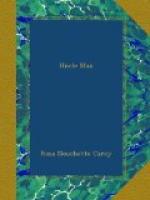It was far too large a house for an unmarried man: the broad staircase and spacious rooms seemed to require the echo of children’s voices. Uncle Max used to call it the barracks, but I think in his heart he liked the roomy emptiness; when he was restless he would prowl up and down the wide landing from one unused room to another. It was an old-fashioned house, and more than one generation had grown up in it. Uncle Max was fond of telling me about his predecessors’ histories. Two little children had died in the big nursery overlooking the garden. There was a little brown room where a ci-devant vicar had written his sermons, with a big cupboard in the wall where he hung his cassock. He had a grown-up family, but his wife was dead. One day he married again and brought home a slim, pale-faced girl—a certain Priscilla Howe—to be the mistress of his house. There were stories rife in the village that her step-children were too much for poor, pretty Priscilla; that while her husband wrote his sermons in the little brown room the young wife pined and moped in her green sitting-room.
Uncle Max found a picture of her one day in a garret where they stored apples; a faint musty smell clung to the canvas. ‘Priscilla Howe’ was written in one corner; there was a childish look on the small oval face; large melancholy eyes seemed appealing to one out of the canvas. She was dressed in a heavy white material like dimity, and held a few primroses between her fingers. What an innocent, pathetic little bride the stern-faced vicar must have brought home!
I read her epitaph afterwards when Uncle Max showed me her grave,—’Priscilla, wife of Ralph Combermere, aged twenty, and her infant son.’ What a sad little inscription! But Uncle Max read something sadder still one day. A letter in faded ink was found in a corner of the same old garret, and the signature was ‘Priscilla’; there was only one sentence legible in the whole, and to whom it was written remained a mystery: ’Trust me, dear love, that I shall ever do my duty, in spite of flaunts and jeers and most unkindly looks; and if God spares me health, which I cannot believe, He may yet right me in the eyes that no longer look at me with fondness.’
Poor Priscilla! so her husband had ceased to love her. No wonder the poor child dwindled and pined among ’the flaunts and jeers and most unkindly looks’ of her step-children. One could imagine her clasping her baby to her sad heart as she closed her eyes to the bitter misunderstanding of this life. ’Where the weary are at rest,’—they might have written those words upon her tomb.
The thought of Priscilla used to haunt me when I roamed about the passages on windy days; the old garret especially seemed haunted by her memory. Uncle Max once said to me that he could have constructed a romance out of her poor little history. ’She came from a place called Ecclesbourne Hall,’ he said, one day. ’She was an heiress; old Ralph Combermere knew what he was about when he transplanted the pale primrose. Do you know, Ursula, this room is supposed to be haunted? And one of the maids told me seriously that Mistress Combermere walks here on windy nights with her babe in her arms. Fancy such a report in an English vicarage!’




